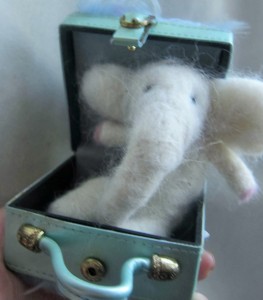On January 27, 2015, my family lived through the first birthday of my mother after her death. On that one day, I cried and I laughed. I bummed around and I got dressed up. I slowed down enough to get nostalgic and I rushed in between hectic events. On that day, I learned that I could experience “all of the above” while still grieving. I also received an unexpected gift.
We celebrated my mother’s birthday in honor of her. When she was alive and especially when she was able bodied, she used to celebrate the birthdays of loved ones who were far away and who had passed away. For her, being absent was not an obstacle to celebrating special occasions. Of course, celebrating special occasions with certain loved ones missing is not the best. Perhaps my mother learned this as a wife of a career diplomat moving globally as an alternative to the feeling of missing out on everything as an expat. We celebrated my mom’s birthday in her absence because she did that for so many of us through the years and because we miss her.
I my mind, I needed to stay at home and absorb my mom’s absence on a day that was probably going to be one of the days of the year I would grieve most intensely.
This year, my mother’s birthday was the same day as a close friend’s wedding. At first I was hesitant about going. I was not sure I would be in the right frame of mind or be emotionally energetic enough to attend a wedding. I thought to myself, “Of all the days in the year, it had to be on her birthday??… How am I supposed to make that decision?” In my mind, I needed to stay at home and absorb my mom’s absence on a day that was probably going to be one of the days of the year I would grieve most intensely.
However, I surprised myself. About two weeks before the wedding, I decided to offer my close friend and his fiance a formal wedding portrait package as my wedding gift. Whatever plans they had for a formal wedding shoot had not yet been solidified so the wedding shoot became useful for the couple. The desire came naturally and I began to look forward to doing this for my friends on their special day.
Doing the wedding photo shoot was a giant step for me. The last formal photo shoot I did was at the end of February, 2014, about two weeks before my mom passed away. That photo shoot took me out of the house for some hours on the last day it turned out she was speaking with full consciousness. It’s still too painful to count exactly how many hours I was away from her side… it’s a useless and pointless kind of painful.
I carried around guilt for over ten months because of the timing of when I left the house to do that last photo shoot.
When I came back home that evening, something seemed different about my mom, but I thought she was just tired. By the next day, her speech and mind slowly began to show signs of deterioration. I carried around guilt for over ten months because of the timing of when I left the house to do that last photo shoot. I had a hard time looking at the photos from that photography session for a long time.
At this exact time I am writing this sentence, I am realizing now that the wedding photo shoot was a gift from my mom to release me from the guilt I carried around for over ten months. The timing of the wedding and the fact that my friends did not yet have any offers for a formal wedding photography session came into play for me to learn that I should not stop doing what I love doing.
The question I previously thought to myself is now my answer: “Of all the days in the year, it had to be on her birthday.”
Because of the wedding, what started off as a day of nostalgia and a sense of homesickness for my mom, ended up being a very full day. January 27th this year started off with me looking at photos and videos of her birthday from last year shortly after midnight. When I woke up in the morning, I called one of my mom’s sisters to talk about my mom and the mini celebration my aunt was preparing for the day also.
I cut fresh roses from our garden and arranged them in various vases on the area we reserved for my mom’s urn. We set the framed photo of my mom, my dad’s favorite photo of her, the birthday balloon and small birthday cake I got later, in the same area. I said my birthday wishes to my mom before I rushed out the door for the photo shoot.
My visually creative side was alive again and everything seemed natural to me. My friends look beautiful in the photos and I am grateful I was there to capture the moment of the day they got married.
The photo shoot was wonderful. My visually creative side was alive again and everything seemed natural to me. My friends look beautiful in the photos and I am grateful I was there to capture the moment of the day they got married. We proceeded to the reception venue and I set up an area for photo sessions for the guests before rushing back home. My dad, my son and I would be home and awake at the same time only in that window before the wedding reception.
When I got home, we celebrated my mom’s birthday and took photos together of the occasion before I quickly dressed up for the wedding reception. I rushed back to the reception wearing an outfit that resembled my mom’s style, including a top she gave me a long time ago. I used one of her purses that matched my outfit. I met up with my date at the reception, someone I laugh a lot with, and we just enjoyed the evening. I took photos, I ate, I drank and I was merry. Within the few hours of the reception, we all created memories that will now always be part of the day my friends got married.
I know my mom would have loved to smell the roses, have some cake, hold the birthday balloon in her hand in her childlike zest for life, and hear all the stories about the rest of the hectic day…(it) makes me cry, but I also smile because she gave me a gift on her birthday.
At the end of the day, I came home to a quiet house. But it was also the quiet you get after a full day lived well. I know my mom would have loved to smell the roses, have some cake, hold the birthday balloon in her hand in her childlike zest for life, and hear all the stories about the rest of the hectic day. To imagine how it would be to still have her here with us on her birthday makes me cry, but I also smile because she gave me a gift on her birthday.
On my mom’s first birthday since her death, my mom gave me this message: “Live days worth telling stories about.”

On January 27, 2015, I learned I must continue to be present in this life, unpause what I love doing and continue to live out my days knowing it’s ok to miss my mom deeply, but also making sure I don’t miss out on life.
Thank you, Mama, for your gift to me on your first birthday since you left us.
We love you, Evangeline Vitug Dumapias, January 27, 1945 – March 15, 2014.



